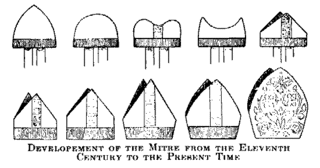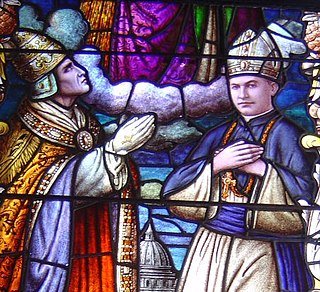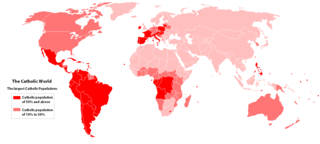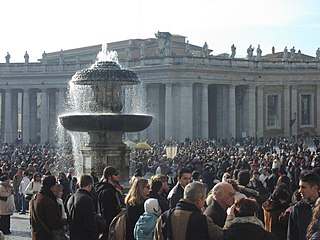Related Research Articles
A bishop is an ordained, consecrated, or appointed member of the Christian clergy who is generally entrusted with a position of authority and oversight.

An episcopal polity is a hierarchical form of church governance in which the chief local authorities are called bishops. It is the structure used by many of the major Christian Churches and denominations, such as the Roman Catholic, Eastern Orthodox, Oriental Orthodox, Church of the East, Anglican, and Lutheran churches or denominations, and other churches founded independently from these lineages.
Christus Dominus is the Second Vatican Council's Decree on the Pastoral Office of Bishops. It was approved by a vote of 2,319 to 2 of the assembled bishops and was promulgated by Pope Paul VI on 28 October 1965. The title in Latin means "Christ the Lord" and is from the first line of the decree, as is customary for Roman Catholic documents. Christus Dominus calls for strong episcopal conferences of bishops, to set the standard for the church in their region, while fully supporting the Vatican and the Pope.

The word diocese is derived from the Greek term dioikesis (διοίκησις) meaning "administration". Today, when used in an ecclesiastical sense, it refers to the ecclesiastical district under the jurisdiction of a bishop.

A synod is a council of a church, usually convened to decide an issue of doctrine, administration or application. The word synod comes from the Greek σύνοδος (sýnodos) meaning "assembly" or "meeting", and it is synonymous with the Latin word concilium meaning "council". Originally, synods were meetings of bishops, and the word is still used in that sense in Catholicism, Oriental Orthodoxy and Eastern Orthodoxy. In modern usage, the word often refers to the governing body of a particular church, whether its members are meeting or not. It is also sometimes used to refer to a church that is governed by a synod.

The highest-ranking bishops in Eastern Orthodoxy, Oriental Orthodoxy, the Catholic Church, and the Church of the East are termed patriarchs.
An ecclesiastical court, also called court Christian or court spiritual, is any of certain courts having jurisdiction mainly in spiritual or religious matters. In the Middle Ages these courts had much wider powers in many areas of Europe than before the development of nation states. They were experts in interpreting canon law, a basis of which was the Corpus Juris Civilis of Justinian which is considered the source of the civil law legal tradition.
An ecclesiastical province is one of the basic forms of jurisdiction in Christian Churches with traditional hierarchical structure, including Western Christianity and Eastern Christianity. In general, an ecclesiastical province consists of several dioceses, one of them being the archdiocese, headed by metropolitan bishop or archbishop who has ecclesiastical jurisdiction over all other bishops of the province.
Ecclesiastical Latin, also called Liturgical Latin or Church Latin, is a later form of Latin used to discuss Christian thought. It developed from the vulgar Latin of the third century Rome. Ecclesiastical Latin includes words of Greek, Hebrew, and Classical Latin origin re-purposed with Christian meaning. It is less stylized and rigid in form than Classical Latin and commonly its pronunciation is based on Italian.

Chancellor is an ecclesiastical title used by several quite distinct officials of some Christian churches.

The Catholic Church in Sierra Leone is part of the worldwide Catholic Church, under the spiritual leadership of the Pope in Rome.
Ecclesiastical polity is the operational and governance structure of a church or of a Christian denomination. It also denotes the ministerial structure of a church and the authority relationships between churches. Polity relates closely to ecclesiology, the study of doctrine and theology relating to church organization.

The Section for Relations with States or Second Section of the Secretariat of State is the body within the Roman Curia charged with dealing with matters that involve relations with civil governments. It has been part of the Vatican Secretariat of State since 1909.

The Catholic Bishops' Conference of India or CBCI is the permanent association of the Catholic bishops of India. It was established in September 1944, in Chennai. The CBCI Secretariat was located in Bangalore until 1962, when it was shifted to the national capital, New Delhi. The CBCI is a member of the Federation of Asian Bishops' Conferences.
The Kerala Catholic Bishops' Council is a permanent association of the Catholic bishops in Kerala . It is an association of three rites of the Catholic Church - the Latin, the Syro Malabar and the Syro Malankara. The objectives of KCBC are to facilitate, co-ordinate, study and discuss questions affecting the Church, and to adopt a common policy and effective action in all matters concerning the Church in Kerala.

Catholic laity are the ordinary members of the Catholic Church who are neither clergy nor recipients of Holy Orders or vowed to life in a religious order or congregation. The laity forms the majority of the estimated over one billion Catholics in the world.
Episcopal conference of Bulgaria is an ecclesiastical institution, consisting of bishops of the Catholic dioceses in the country. It is birritual because it includes in its composition dioceses in Latin and Byzantine-Slavic rites. Episcopal Conference in Bulgaria is the governing body of the Catholic Church in Bulgaria and performs almost the same features as the Holy Synod in Orthodox churches.
An ecclesiastical region is a formally organised geographical group of dioceses, ecclesiastical provinces or parishes, without a proper Ordinary as such, in Catholic or Protestant Churches.
References
- 1 2

| This Catholic Church–related article is a stub. You can help Wikipedia by expanding it. |